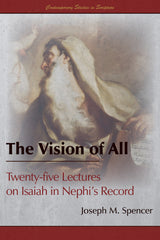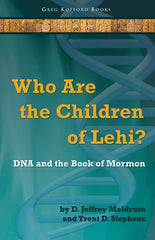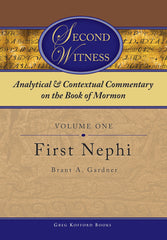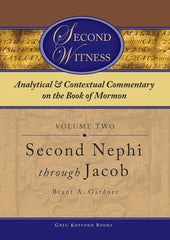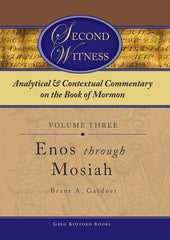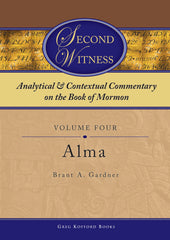News
Book of Mormon Flash Sale: 40%-64% off! September 20 2018
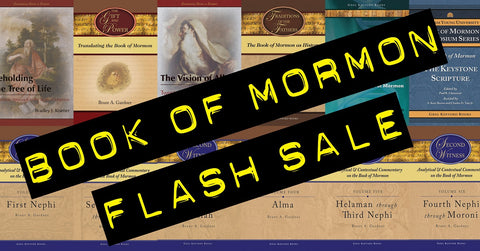
Friday, Sep 21 through Monday, Sep 24
In commemoration of Joseph Smith receiving the golden plates on September 22, 1827, we are pleased to offer a sale on the following Book of Mormon titles:*
Ebooks
|
$20.99 |
$27.99 |
$22.99 |
|
$27.99 |
$9.99 |
Print Books
|
$39.95 |
$39.95 |
$39.95 |
|
$49.95 |
$39.95 |
$39.95 |
|
$34.95 |
|
$129.95 |
*Offer valid for US domestic customers only. Print book sale limited to available supply.
Q&A Part 2 with the Editors of The Expanded Canon: Perspectives on Mormonism & Sacred Texts September 11 2018

Hardcover $35.95 (ISBN 978-1-58958-637-6)
Part 2: Q&A with Brian D. Birch (Part 1)
Q: When and how did the Mormon Studies program at UVU launch?
A: The UVU Mormon Studies Program began in 2000 with the arrival of Eugene England. Gene received a grant from the National Endowment for the Humanities to explore how Mormon Studies could succeed at a state university. A year-long seminar resulted that included a stellar lineup of consultants and guest scholars. From that point forward, the Religious Studies Program has developed multiple courses complemented by our annual Mormon Studies Conference and Eugene England Lecture—to honor Gene’s tragic and untimely passing in 2001. The program also hosts and facilitates events for independent organizations and publications including the Society for Mormon Philosophy and Theology, the Dialogue Foundation, the Interpreter Foundation, Mormon Scholars in the Humanities, Association for Mormon Letters, and others.
Q: How is the UVU Mormon Studies program distinguished from Mormon Studies programs that have emerged at other campuses?
A: Mormon Studies at UVU is distinguished by the explicitly comparative focus of our work. Given the strengths of our faculty, we have emphasized courses and programming that addresses engagement and dialogue across cultures, faith traditions, and theological perspectives. Permanent course offerings include Mormon Cultural Studies, Mormon Theology and the Christian Tradition, Mormon Anthropology, and Mormon Literature. Our strengths lie in areas other than Mormon history, which is well represented at other institutions—and appropriately so. Given the nature of our institution, our events are focused first and foremost on student learning, but all our events are free and open to the public and we welcome conversation between scholars and nonprofessionals.
Q: How long has the annual UVU Mormon Studies Conference been held, and what have been some of the topics of past conferences?
A: As mentioned above, the Mormon Studies Conference was first convened by Eugene England in 2000, and to date we have convened a total of nineteen conferences. Topics have ranged across a variety of issues including “Islam and Mormonism,” “Mormonism in the Public Mind,” “Mormonism and the Art of Boundary Maintenance,” “Mormonism and the Internet,” etc. We have been fortunate to host superb scholars and to bring them into conversation with each other and the broader public.
Q: Where did the material for the first volume, The Expanded Canon, come from?
A: The material in The Expanded Canon emerged came from our 2013 Mormon Studies Conference that shares the title of the volume. We drew from the work of conference presenters and added select essays to round out the collection. The volume is expressive of our broader approach to bring diverse scholars into conversation and to show a variety of perspectives and methodologies.
Q: What are a few key points about this volume that would be of interest to readers?
A: Few things are more central to Mormon thought than the way the tradition approaches scripture. And many of their most closely held beliefs fly in the face of general Christianity’s conception of scriptural texts. An open or expanded canon of scripture is one example. Grant Underwood explores Joseph Smith’s revelatory capacities and illustrates that Smith consistently edited his revelations and felt that his revisions were done under the same Spirit by which the initial revelation was received. Hence, the revisions may be situated in the canon with the same gravitas that the original text enjoyed. Claudia Bushman directly addresses the lack of female voices in Mormon scripture. She recommends several key documents crafted by women in the spirit of revelation. Ultimately, she suggests several candidates for inclusion. As the Mormon canon expands it should include female voices. From a non-Mormon perspective, Ann Taves does not embrace a historical explanation of the Book of Mormon or the gold plates. However, she does not deny Joseph Smith as a religious genius and compelling creator of a dynamic mythos. In her chapter she uses Mormon scripture to suggest a way that the golden plates exist, are not historical, but still maintain divine connectivity. David Holland examines the boundaries and intricacies of the Mormon canon. Historically, what are the patterns and intricacies of the expanding canon and what is the inherent logic behind the related processes? Additionally, authors treat the status of the Pearl of Great Price, the historical milieu of the publication of the Book of Mormon, and the place of The Family: A Proclamation to the World. These are just a few of the important issues addressed in this volume.
Q: What is your thought process behind curating these volumes in terms of representation from both LDS and non-LDS scholars, gender, race, academic disciplines, etc?
A: Mormon Studies programing at UVU has always been centered on strong scholarship while also extending our reach to marginalized voices. To date, we have invited guests that span a broad spectrum of Mormon thought and practice. From Orthodox Judaism to Secular Humanists; from LGBTQ to opponents to same-sex marriage; from Feminists to staunch advocates of male hierarchies, all have had a voice in the UVU Mormon Studies Program. Each course, conference, and publication treating these dynamic dialogues in Mormonism are conducted in civility and the scholarly anchors of the academy. Given our disciplinary grounding, our work has expanded the conversation and opened a wide variety of ongoing cooperation between schools of thought that intersect with Mormon thought.
Q: What can readers expect to see coming from the UVU Comparative Mormon Studies series?
A: Our 2019 conference will be centered on the experience of women in and around the Mormon traditions. We have witnessed tremendous scholarship of late in this area and are anxious to assemble key authors and advocates. Other areas we plan to explore include comparative studies in Mormonism and Asian religions, theological approaches to religious diversity, and questions of Mormon identity.
Download a free sample of The Expanded Canon
Listen to an interview with the editors
Upcoming events for The Expanded Canon:
Tue Sep 18 at 7pm | Writ & Vision (Provo) | RSVP on Facebook
Wed Sep 19 at 5:30 pm | Benchmark Books (SLC) | RSVP on Facebook
Q&A Part 1 with the Editors of The Expanded Canon: Perspectives on Mormonism & Sacred Texts August 29 2018

Hardcover $35.95 (ISBN 978-1-58958-637-6)
Part 1: Q&A with Blair G. Van Dyke (Part 2)
Q: How is the Mormon Studies program at Utah Valley University distinguished from Mormon Studies programs that have emerged at other universities?
A: The Mormon Studies program at UVU is distinguished by the comparative components of the work we do. At UVU we cast a broad net across the academy knowing that there are relevant points of exploration at the intersections of Mormonism and the arts, Mormonism and the sciences, Mormonism and literature, Mormonism and economics, Mormonism and feminism, Mormonism and world religions, and so forth. Additionally, the program is distinguished from other Mormon Studies by the academic events that we host. UVU initiated and maintains the most vibrant tradition of creating and hosting relevant and engaging conferences, symposia, and intra-campus events than any other program in the country. Further, a university-wide initiative is in place to engage the community in the work of the academy. Hence, the events held on campus are focused first and foremost for students but inviting the community to enjoy our work is very important. This facilitates understanding and builds bridges between scholars of Mormon Studies and Mormons and non-Mormons outside academic orbits.
Q: Where did the material for The Expanded Canon come from?
A: The material that constitutes volume one of the UVU Comparative Mormon Studies Series came from an annual Mormon Studies Conference that shares the title of the volume. We drew from the work of some of the scholars that presented at that conference to give their work and ours a broader audience. Generally, the contributors to the volume are not household names or prominent authors that regularly publish in the common commercial publishing houses directed at Mormon readership. As such, this volume introduces that audience to prominent personalities in the field of Mormon Studies. It is not uncommon for scholars in this field of study to look for venues where their work can reach a broader readership. This jointly published volume accomplishes that desire in a thoughtful way.
Q: What are a few key points about this volume that would be of interest to readers?
A: Few things are more central to Mormon thought than the way the tradition approaches scripture. And many of their most closely held beliefs fly in the face of general Christianity’s conception of scriptural texts. An open or expanded canon of scripture is one example. Grant Underwood explores Joseph Smith’s revelatory capacities and illustrates that Smith consistently edited his revelations and felt that his revisions were done under the same Spirit by which the initial revelation was received. Hence, the revisions may be situated in the canon with the same gravitas that the original text enjoyed. Claudia Bushman directly addresses the lack of female voices in Mormon scripture. She recommends several key documents crafted by women in the spirit of revelation. Ultimately, she suggests several candidates for inclusion. As the Mormon canon expands it should include female voices. From a non-Mormon perspective, Ann Taves does not embrace a historical explanation of the Book of Mormon or the gold plates. However, she does not deny Joseph Smith as a religious genius and compelling creator of a dynamic mythos. In her chapter she uses Mormon scripture to suggest a way that the golden plates exist, are not historical, but still maintain divine connectivity. David Holland examines the boundaries and intricacies of the Mormon canon. Historically, what are the patterns and intricacies of the expanding canon and what is the inherent logic behind the related processes? Additionally, authors treat the status of the Pearl of Great Price, the historical milieu of the publication of the Book of Mormon, and the place of The Family A Proclamation to the World. These are just a few of the important issues addressed in this volume.
Q: What is your thought process behind curating these volumes in terms of representation from both LDS and non-LDS scholars, gender, race, academic disciplines, etc?
A: Mormon Studies programing at UVU has always been centered on solid scholarship while simultaneously broadening tents of inclusivity. To date, we have invited guests that span spectrums of thought related to Mormonism. From Orthodox Judaism to Secular Humanists; from LGBTQ to opponents to same-sex marriage; from Feminists to staunch advocates of male hierarchies, all have had a voice in the UVU Mormon Studies Program. Each course, conference, and publication treating these dynamic dialogues in Mormonism are conducted in civility and the scholarly anchors of the academy. Given our disciplinary grounding, our work has expanded the conversation and opened a wide variety of ongoing cooperation between schools of thought that intersect with Mormon thought.
Download a free sample of The Expanded Canon
Listen to an interview with the editors
Tue Sep 18 at 7pm | Writ & Vision (Provo) | RSVP on Facebook
Wed Sep 19 at 5:30 pm | Benchmark Books (SLC) | RSVP on Facebook
Author Spotlight: Blake T. Ostler July 16 2018

Conversation with Blake T. Ostler
We sat down with Blake Ostler for a short interview just in time for the paperback re-issue of Exploring Mormon Thought, Vol. 1: The Attributes of God. Blake is an attorney and independent scholar residing in Salt Lake City, Utah, and the author of the multi-volume Exploring Mormon Thought series along with over forty published articles.
Q: What began your interest in studying philosophy and theology?
A: I was a young whippersnapper when I ran into Zen and the Art of Motorcycle Maintenance by Robert Persig who died earlier this year. Because I had raced motorcycles and often rode motorbikes with my Dad, it was the perfect intro to philosophy—and it is still the best-selling book related to philosophy of all time. I was only a Junior in High School student, but for some reason I thought I could tackle Immanuel Kant's Critique of Pure Reason. I was foolish but did it anyway. I became fascinated with Kant's view that our consciousness depends on an organizational unity and categories that are not present in the things we experience, but that, in effect, we create the unity of consciousness and provide the categories to make sense of our experience and any concepts presented to us.
Q: In your course of studying some of the greatest thinkers who ever lived, what are some of the most important questions about existence that we can ask?
A: The first question to be asked is: How is it possible that questions can be asked? Implicit in this question is: Who or what is doing the asking? How is it possible to formulate questions for a response at all? Can I come up with these questions through insight and the creativity of imagination, or I am just a conduit for all of the causes that came before? Is there an "I" asking questions or is it just a mechanism with the appearance of unity of identity? And the ultimate question: How am I aware at all to ask questions and aware that questions need to be or can asked? Is it morally obligatory to ask questions and seek knowledge? Finally: Of whom am I asking questions? Does this other have a mind that can understand the question? How would I or could I know the answer to that question?
Q: What are the differences between theology, philosophical theology, and what we do in Sunday School? How can members of the Church benefit from each?
A: Theology is the attempt of a person who has belief (and the faith that those beliefs are true) to make sense of those beliefs in the world circumstances in which that person resides. Philosophical theology is the critical assessment of religious beliefs and systems in the widest sense using the tools of philosophical inquiry. Sunday School is the participation in community interactions seeking to dialogue regarding various subjects of shared importance or imposed importance.
It is a mistake to think that these three must necessarily intersect. The communal sharing of inquiry within a Sunday School class need not involve either theology or philosophical theology. It could consist of just sharing news about each other’s lives. But Sunday School necessarily is done in a communal setting and usually by folks who share enough commonality in belief to make genuine sharing of our deeply held commitments possible and meaningful. To the extent that theology or philosophy may provide insights to enrich and edify, they are appropriate in Sunday School. To the extent that arguing for or elucidating a position using the categories and tools of theology or philosophy is done in good faith and with positive regard for others in the class, it seems to me to be valuable—because the immersion in these disciplines is given as a gift to others out of love. To the extent that it creates tension and contention, these disciplines can interfere with the communal purposes of sharing life together along a journey of exploration that only gets in the way of the very community that fosters the very endeavor in the first place.
It is a very serious mistake to think that what must happen in Sunday School is a high-level discussion of the philosophy of religion or Biblical scholarship. Like other disciplines, such learning can be used as a tool for self-aggrandizement or fostering a sense of superiority or just plain old snottiness. That is inimical to Christianity. Others may feel intimidated and unable to join the discussion. That can even happen unintentionally. Any Sunday School class that excludes in any way is something to be avoided.
Q: You have a fourth volume in the pipeline. Can you give us a sneak peek at what its focus will be?
A: The Fourth Volume (boy that seems pretentious) focuses on the problem of evil from three very different perspectives that are all live-options in Mormon thought. I elucidate a Naturalistic Finitist Theodicy that departs from the view that God is after the universe. That is, the universe existed before God became God fully divine and He grew up in an already fully-ordered cosmos and became divine by following the natural moral laws that lead to divinity. I also present a fully-developed Process Theodicy—that is the view that God is with the cosmos and in each moment of the cosmos' existence has provided an Initial Aim to lure the cosmos to reflect His desires for it. I also present a theodicy departing from the view that God is before the universe in the sense that God ordered the cosmos and all order depends on God's prior creative acts.
Thanks, Blake! We're looking forward to your next volume!
Don't miss our podcast interview with Blake on the Greg Kofford Books AuthorCast!
 Exploring Mormon Thought, Vol 1: The Attributes of God
Exploring Mormon Thought, Vol 1: The Attributes of God
By Blake T. Ostler
Now available in paperback!
542 pages
$30.95 paperback
Part of the Exploring Mormon Thought series



